Plant Combinations, Border Ideas, Spring Borders, Summer Borders, Companion Plants, Syringa
A lilac in full bloom, with its heavenly fragrance, is a breathtaking sight. A mainstay of the spring landscape in northern and colder climates, lilacs are one of the most effective flowering shrubs. Easy to grow, tough as nails, deer resistant, and relatively free from major pests, these hardy shrubs have been tailored to meet the needs of all gardens.
While extraordinarily good-looking on their own during their blooming season, Lilacs do not add much sparkle during the rest of the growing season. To extend their season of interest, they need companion plants that will provide color against the green foliage of the midsummer lilacs. Well-behaved, they make perfect partners with other shrubs or perennials and help create strikingly beautiful combinations in the garden.
Surrounding your Lilacs with a succession of flowers and foliage plants will reinforce the beauty of their blooms and extend the season of interest in your landscape. Here is the list of favorite companion plants for your Lilacs
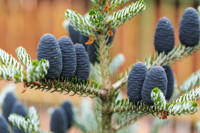 |
Conifers
Among nature’s most beautiful and interesting trees, conifers deserve a spot in most gardens. Adding year-round beauty and structure to your landscape, these shapely and statuesque evergreens include Pines (Pinus), Spruces (Picea), Firs (Abies), Cedars (Cedrus), False Cypresses (Chamaecyparis), and many others. |
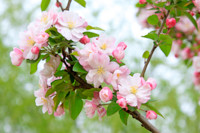 |
Flowering Crabapples Flowering crabapples (Malus) are stunning trees with 2 seasons of interest: most bloom profusely 1-2 weeks before the lilacs in spring and produce brilliantly colored fruit from the summer into the late fall. Though fruits are not appropriate for human consumption, they are vital to insects, birds, and small animals. |
 |
Flowering Dogwoods Flowering dogwoods (Cornus) are excellent landscape choices for all four seasons and wonderful companions for early-blooming lilacs. Awakening in spring with their delicate bracts, their foliage turns glorious shades of gold, red, or purple in fall and their brilliant red berries attract winter songbirds for the pleasure of all. |
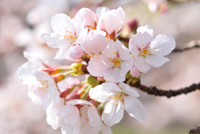 |
Flowering Cherries Flowering cherries (Prunus) are terrific ornamental plants with their profusion of spring flowers, handsome foliage and shape, and sometimes shiny bark. Most of them are at their peak when the lilacs are still in bloom, and they both create a spectacular floral display. |
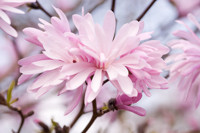 |
Magnolias Magnolias are outstanding early flowering trees of great beauty, and more effort to combine the pleasures of magnolias and lilacs should be made. Bloom time of most of the choicest deciduous magnolias overlaps with Syringa vulgaris, the common lilac. They like the same deep, well-drained, enriched loam. |
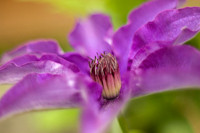 |
Clematis After flowering, most lilacs offer limited interest. To extend the season of interest of your lilac, grow clematis with different bloom times through its branches to add color and glamour to the shrub. Choose a clematis type that blooms mid- or late-season and bursts into bloom after your lilac. Clematis viticella is probably the most popular choice for growing through a shrub. |
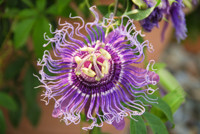 |
Passion Flowers Passion Flowers (Passiflora) are among the most exotic vines to enjoy in our gardens. Easy to grow, they reward us with their bold, beautiful, fascinating blossoms over a long season, and some give way to delectable passion fruits. Passion Vines are trouble-free climbers that cling with tendrils, and lilac shrubs make ideal trellises for them. Passiflora incarnata (Wild Passion Flower) is the hardiest of the passion flowers and will add striking color after the lilac blooms have faded. |
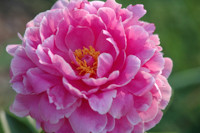 |
Peonies Herbaceous peonies and tree peonies (Paeonia) are wonderful companions to lilacs. They are compatible in color, fragrance, and form and make each other look better. Plant peonies at your lilac’s foot to hide its poorly clad legs and savor the beauty and pervasive perfume they lavish on those who passes-by. |
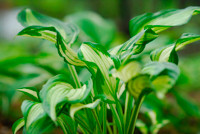 |
Hostas The large, showy leaves of Hostas complement nicely the blooms of the lilacs. Put in a glorious bed of hostas on the northern or western side of your lilac bushes. Blanket the foreground of pink lilacs with some of the blue hostas. Use golden-leaved hostas for white or lavender lilacs. There is an amazing number of hostas available in a wide range of sizes, shapes, and colors, and create striking combinations! |
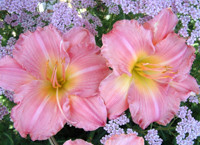 |
Hemerocallis Hemerocallis (Daylilies) are colorful, spreading perennials that help hide the leggy base of lilacs. They are often called the perfect perennial because of their numerous qualities: showy flowers, a wide array of vibrant colors, drought tolerance, the ability to grow in most areas, and low care requirements. They are remarkable and stunning additions to the garden, blooming vigorously for weeks and weeks. They parade their attractive blossoms in summer, and the green of the lilacs becomes a wonderful background. |
There is a wide range of companion plants that will bring out the best qualities of your Lilacs and share their space with a serene balance. Make sure you select any ornamental grasses, perennials, shrubs, or trees that have the same growing requirements as your Lilacs.
| Plant Type | Shrubs |
|---|---|
| Genus | Syringa |
| Exposure | Full Sun |
| Season of Interest |
Spring (Mid, Late) Summer (Early) |
| Soil Type | Chalk, Clay, Loam, Sand |
| Soil pH | Alkaline, Neutral |
| Soil Drainage | Moist but Well-Drained, Well-Drained |
| Characteristics | Cut Flowers, Fragrant, Showy |
| Tolerance | Deer |
123rf
| Plant Type | Shrubs |
|---|---|
| Genus | Syringa |
| Exposure | Full Sun |
| Season of Interest |
Spring (Mid, Late) Summer (Early) |
| Soil Type | Chalk, Clay, Loam, Sand |
| Soil pH | Alkaline, Neutral |
| Soil Drainage | Moist but Well-Drained, Well-Drained |
| Characteristics | Cut Flowers, Fragrant, Showy |
| Tolerance | Deer |
Create a membership account to save your garden designs and to view them on any device.
Becoming a contributing member of Gardenia is easy and can be done in just a few minutes. If you provide us with your name, email address and the payment of a modest $25 annual membership fee, you will become a full member, enabling you to design and save up to 25 of your garden design ideas.
Join now and start creating your dream garden!
Create a membership account to save your garden designs and to view them on any device.
Becoming a contributing member of Gardenia is easy and can be done in just a few minutes. If you provide us with your name, email address and the payment of a modest $25 annual membership fee, you will become a full member, enabling you to design and save up to 25 of your garden design ideas.
Join now and start creating your dream garden!